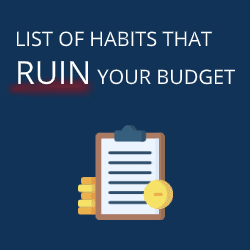Taking care of your finances is never easy – whether you’re in high school, a young adult who just started living alone, or a full-fledged adult.
There will always be times when you find yourself in a difficult spot because of your own bad money habits.
Schools and colleges teach us a lot about economic theory and business models.
But when we graduate, very few of us know what bad money management is.
There are many budget-breaking habits that are surprisingly common.
Not educating yourself and fixing your habits is how to ruin your financial life.
Luckily, we’re here today with a list of habits that ruin your budget. If you think you’re doing any of these, change them asap!

1. You Buy Impulsively
Let’s start with the obvious one. One of the worst bad money habits is buying things impulsively. Out grocery shopping and end up splurging on snacks at the checkout counter? Or maybe you saw a flash sale post on your Instagram and ended up spending more than $100 in a matter of minutes? Businesses know that we give in to our impulses, so they specifically employ these tactics to promote impulse buying.
But you can’t give in! The next time you think of buying something on a whim, stop and ask yourself, ‘do I really need it?’ If the answer is no, then put it back. A lot of people also end up impulse buying by telling themselves that they deserve it or that they want to treat themselves. Do you know what’s really a good treat to get your own self? A wallet full of cash.
2. Outdated Memberships
Remember subscribing to that really cheap virtual gym service? Only $10 dollars a month, and I can exercise at home? Yes, why not! And just like that you’ve committed to paying $10 a month and now a year’s gone by, you haven’t exercised, and you’re out $120.
A lot of service providers, both online and in real life, use this trick. They’ll offer very cheap subscriptions that will automatically be deducted from your account every month, knowing that you won’t really utilize the service. Essentially, you’re paying these businesses for just existing!
We advise that you go through a list of your subscriptions and cancel the ones you don’t need. This goes for any gym or spa memberships, any magazine subscriptions, any streaming services you don’t use. If you haven’t used it in the last month, it’s time to say bye!
3. Not looking at alternatives
Many people will splurge on an overly expensive item or service because they’re too lazy to find a better service – one that’s either cheaper of offers you better value for money. For example, do you always go to the coffee shop next to your house? Maybe a look around your neighborhood will lead you to find another coffee shop whose drinks are just as good and also cheaper! Don’t let the need for convenience be a source of bad money management.
Another example of this is when students splurge on an online plagiarism checker. If you’re thinking I need to check my paper for plagiarism, why would you spend so many dollars to do so when you can use a cheaper and better online plagiarism checker like the EduBirdie plagiarism checker? By the way it is completely free for everyone! Remember, before you commit to buying something, you need to look for alternatives! It’s not like they’re too hard to find. One search on the net should give you sufficient options.

4. Eating Out
Let’s face it. Take-out food is convenient, fast, and cheap. $7 for a whole meal sounds appealing, and you may even think you’re saving yourself money. After all, groceries seem so expensive nowadays, and when you go to the grocery store, you can rack up a high bill. But trust us, if you’re wondering how to ruin your financial life, eating out would make a list.
When you eat out, you’re also unlikely to track how much you’re spending. Because you identify it as generally cheap, you may not realize that you’re actually spending a lot. If take-out food or fast food averages to $10 a meal, and let’s say you only eat one meal a day – that’s roughly $300 a month. $600 if you’re eating two meals a day!
5. No savings
Last on our list is one of the worst bad money habits out there – not saving. This too, is something no one ever emphasizes enough for us when we’re growing up. That is unless you’re one of the fortunate few who have financially savvy mentors or guardians. As an adult, you must have savings. If one day, you’re out of a job, you need to have something to fall back on.
A good financial habit to incorporate in your life is automated savings. This means you open a savings account at the same bank where your checking account is. Then opt for automatic transfer to your savings account. This means that every month a sum of money that you will decide when opting for the service will be transferred from your checking account to your savings account. This way, you don’t have to worry about always putting money into your savings account – it’ll happen by itself!
Of course, it goes without saying that no one expects you to put your whole or even half of your paycheck into your savings account. A good amount to transfer would be 10 to 20% of your monthly income.
Conclusion
Being able to manage money is a very important skill to have if you want to live a stress-free life. We definitely recommend that you begin to rid yourself of bad money habits as soon as you can. The longer the habit stays, the more difficult it is to change!



